译林高中英语模块三Unit3 Back to the past 语言点课件(28张PPT)
文档属性
| 名称 | 译林高中英语模块三Unit3 Back to the past 语言点课件(28张PPT) |

|
|
| 格式 | zip | ||
| 文件大小 | 2.0MB | ||
| 资源类型 | 教案 | ||
| 版本资源 | 牛津译林版 | ||
| 科目 | 英语 | ||
| 更新时间 | 2020-04-17 08:31:23 | ||
图片预览

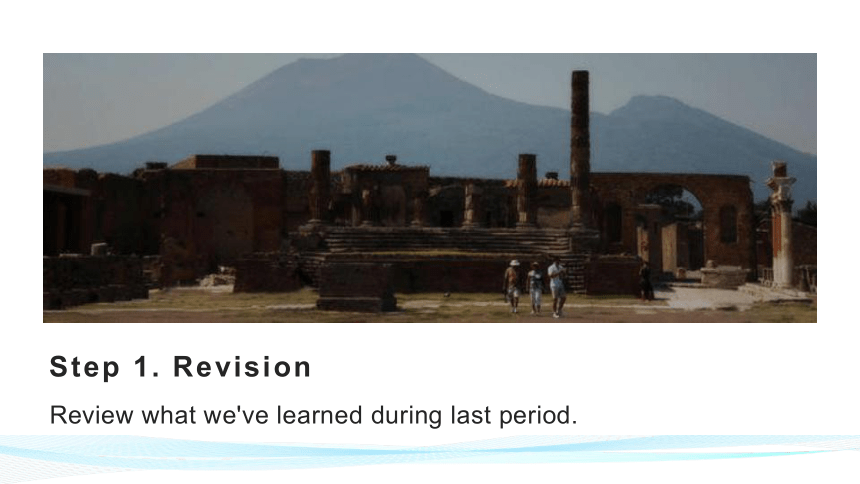
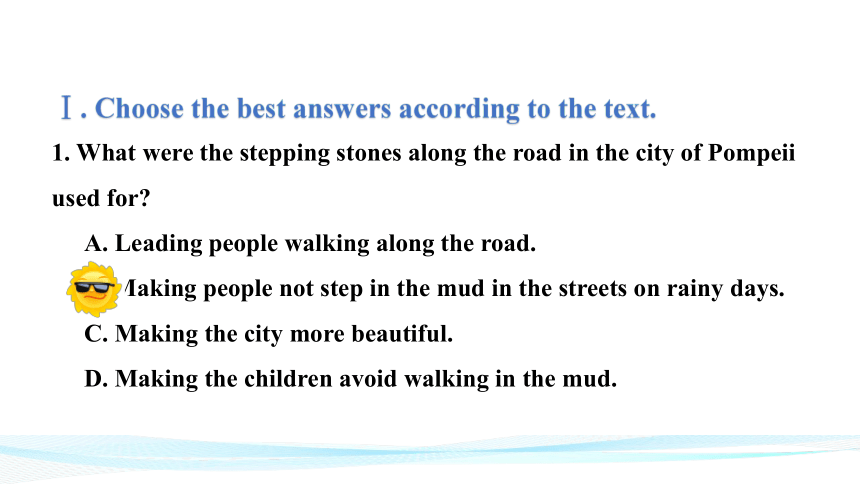
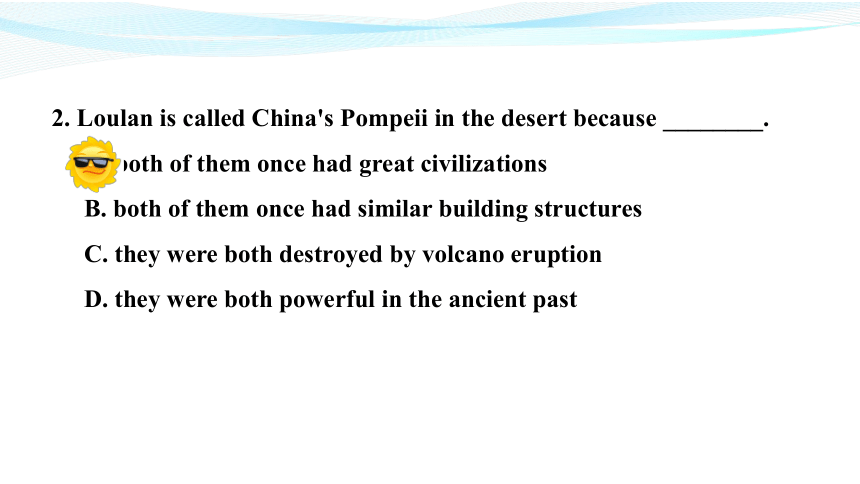
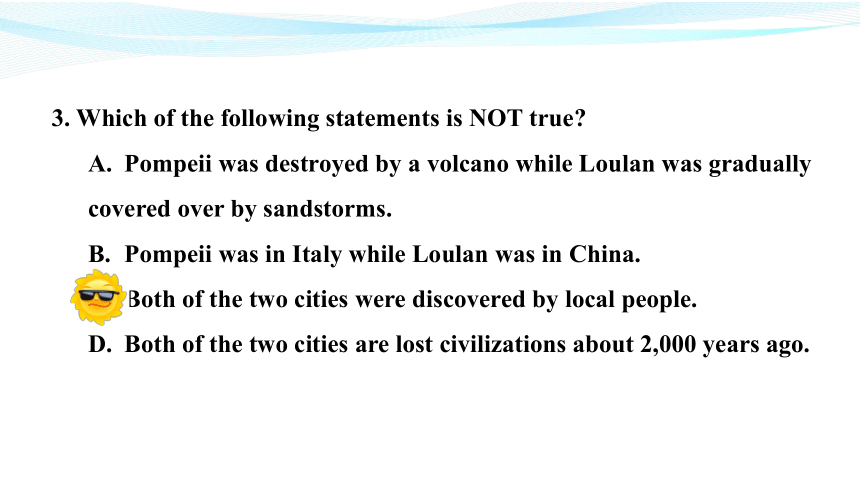
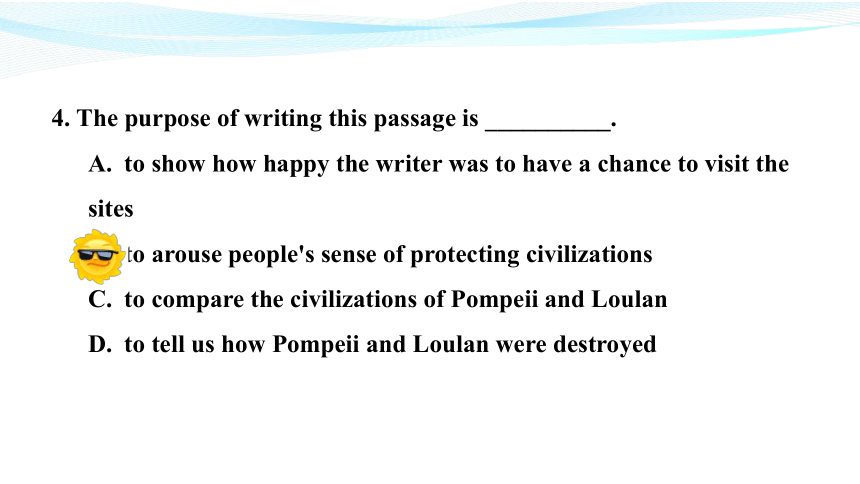
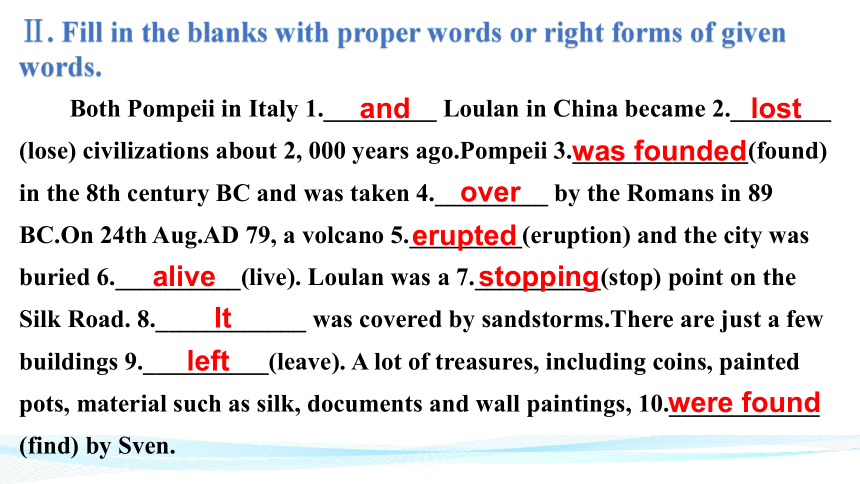
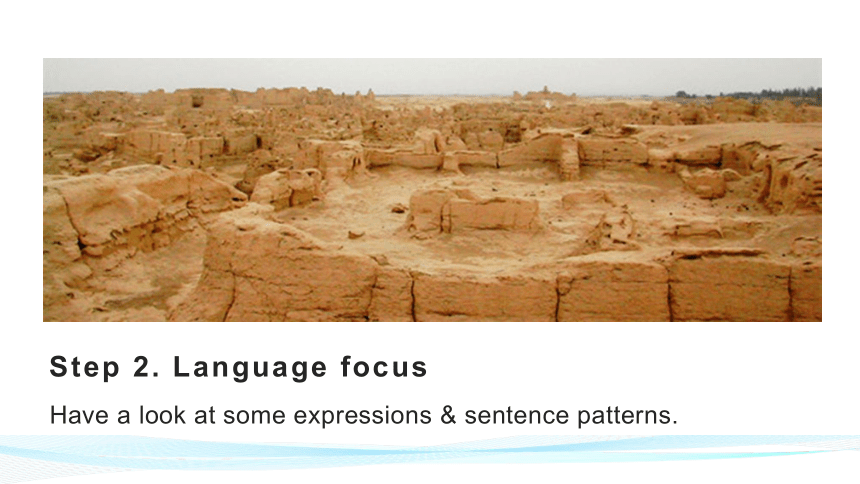
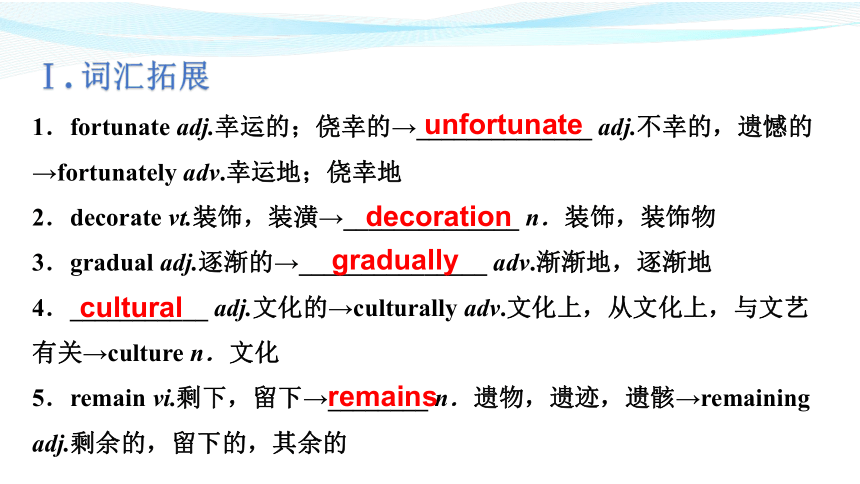
文档简介
(共29张PPT)
Reading
M3U3 Back to the past
Review what we've learned during last period.
Step 1. Revision
Ⅰ. Choose the best answers according to the text.
1. What were the stepping stones along the road in the city of Pompeii used for?
A. Leading people walking along the road.
B. Making people not step in the mud in the streets on rainy days.
C. Making the city more beautiful.
D. Making the children avoid walking in the mud.
2. Loulan is called China's Pompeii in the desert because ________.
A. both of them once had great civilizations
B. both of them once had similar building structures
C. they were both destroyed by volcano eruption
D. they were both powerful in the ancient past
3. Which of the following statements is NOT true?
Pompeii was destroyed by a volcano while Loulan was gradually covered over by sandstorms.
Pompeii was in Italy while Loulan was in China.
Both of the two cities were discovered by local people.
Both of the two cities are lost civilizations about 2,000 years ago.
4. The purpose of writing this passage is __________.
to show how happy the writer was to have a chance to visit the sites
to arouse people's sense of protecting civilizations
to compare the civilizations of Pompeii and Loulan
to tell us how Pompeii and Loulan were destroyed
Ⅱ. Fill in the blanks with proper words or right forms of given words.
Both Pompeii in Italy 1._________ Loulan in China became 2.________ (lose) civilizations about 2, 000 years ago.Pompeii 3.______________(found) in the 8th century BC and was taken 4._________ by the Romans in 89 BC.On 24th Aug.AD 79, a volcano 5._________(eruption) and the city was buried 6.__________(live). Loulan was a 7.__________(stop) point on the Silk Road. 8.____________ was covered by sandstorms.There are just a few buildings 9.__________(leave). A lot of treasures, including coins, painted pots, material such as silk, documents and wall paintings, 10.____________ (find) by Sven.
and
lost
was founded
over
erupted
alive
stopping
It
left
were found
Have a look at some expressions & sentence patterns.
Step 2. Language focus
Ⅰ. 词汇拓展 1.fortunate adj.幸运的;侥幸的→______________ adj.不幸的,遗憾的→fortunately adv.幸运地;侥幸地 2.decorate vt.装饰,装潢→______________ n.装饰,装饰物 3.gradual adj.逐渐的→_______________ adv.渐渐地,逐渐地 4.___________ adj.文化的→culturally adv.文化上,从文化上,与文艺有关→culture n.文化 5.remain vi.剩下,留下→________ n.遗物,遗迹,遗骸→remaining adj.剩余的,留下的,其余的
unfortunate
decoration
gradually
cultural
remains
Ⅱ. 核心词汇
1. The city was founded in the 8th century BC.
found ... on/upon 建立在……之上,以……为基础或根据
foundation n. 创立, 设立, 基础
founder n. 创立者, 创办人
单句改错
(1) Founding in the early 20th century, the school keeps on inspiring children's love of art.
(2) I found my hopes of success in my own hard work.
Founded
on/ upon
兴建,创建;建立
2. In 89 BC, the Romans took over Pompeii.
夺取;接管;接手;取代,接替;继承
The company he works for has recently been taken over.
The police were ordered to stand down until the FBI came to take over.
I've taken over from Catherine as head of the sales department.
Mobile phones have largely taken over home phones for most people in recent years.
Will you take these documents over to the legal team for them to review?
The ferry will take you over the channel in about four hours.
take的常见短语
take up take down take off take in
take back
take away
take apart
take on
占用(时间、空间等);开始做,开始从事;继续
拿下;取下;写下;记下;拆除
起飞;脱掉;取得成功;拿掉;取消;离开;休假
收留;摄取,吸入;理解;欺骗
退回(货品);收回(说过的话)
拿走,带走;解除,消除(痛苦等)
拆开,拆卸
呈现;具有(特征、外观等);聘用,雇用;承担
即学即用
① 没有任何别的组织有能力或愿意承担此项工作。
No other organization was able to or willing to _____________________.
② 当他们同时进门或出门的时候,男士别忘了接女士脱下来的风衣或帮她拿外套。
When a man and a woman go in or out of a room together, a man should also help the woman __________________________ her coat.
take on the job
take off or put on
3. On 24 August AD 79,the volcano erupted and lava, ash and rocks poured out of it onto the surrounding countryside.
She poured ____ her worries about her husband’s health to the doctor.
她向医生倾吐出自己对丈夫的健康的担心。
Letters have been pouring _____ the office complaining about this kind of TV set.
办公室连续收到大批信件抱怨这种电视机。
I had just got home when the rain poured _______.
我刚到家, 就在这时大雨倾盆而下。
out
into
down
喷,涌,倒(水...)
4. It turns out that after the ash covered the people who failed to flee the city,their bodies nearly completely broke down and disappeared,leaving empty spaces in the ash.
turn out 结果是, 证明是;生产, 制造;培养,训练;出动
I did read my newspaper out loud on a train,and it turned out well.
The truth turned out to be stranger than we had expected.
It turns out that she had known him when they were children.
Thousands of people turned out to welcome the team home.
flee vt.& vi. 逃避,逃跑;迅速离开
flee away 逃离
flee from 从……逃离;避免……
flee to 逃到……
flee in all directions 四处逃窜
flee (from) responsibility 逃避责任
Why does she always flee any kind of responsibility?
The child fled to his mother, looking for safety.
区分:flee/ escape
flee 表示“逃走”,着重逃的动作,强调逃走时的急促或仓促。
escape 表示“逃脱”,主要是指从被监禁或类似没有自由的状态中逃脱,通常不与away或off连用。
The enemy soldiers were fleeing in all directions,but few of them could escape.
escape 还可以表示被遗忘或未被注意,也可指逃避或躲避不愉快的事。
It was an actor whose name escapes me for the moment.
The two officers were extremely lucky to escape serious injury.
break down
To put it simply, protein takes a lot of effort for the body to break down and digest.
Our car broke down and we had to push it off the road.
When we gave her the bad news, she broke down and cried.
The only way out, long term, is to break down the walls that make up the prison.
Talks with business leaders broke down last night.
If Tim carries on working like this, he'll break down sooner or later.
分解
出故障;坏掉
崩溃
拆除;破除,消除
(讨论、关系或系统)失败;失灵
垮掉;坍塌
break away (from...) 逃脱;脱离 break in 打断,插嘴;强行闯入 break into 强行进入;突然开始(笑、欢呼等) break out (战争、火灾等)突然发生,爆发 break up 打碎;(关系)破裂;(会议等)结束
break through 克服,突破
It's very impolite of you to _____________ while we're talking.
She met her second husband not long after her first marriage _______________.
break in
broke up
5. A scholar from the local cultural institute,Professor Zhang,told us that around the year 1900 the European explorer Sven Hedin discovered the ruins of the Loulan Kingdom.
ruin n.废墟;毁坏 vt.破坏,毁灭
Three days later, the fire was put out and some 500 blocks were in ruins.
in ruins 成为废墟
bring...to ruin 使……毁灭,使……没落
fall/go into ruin 衰落,败落,荒废
ruin oneself 自取灭亡,自毁前程
区分:destroy/ damage/ ruin
destroy vt. 常指彻底破坏,以致不能或很难修复,常作“破坏,毁灭”讲,也 可指“希望、计划” 等破灭。
damage vt. & n.指部分损坏或使用价值有所降低;作名词时常和to sth.连用。
ruin vt.&n.多指自然因素对建筑物、动植物、城镇等带来严重破坏,破坏的后果往往是事物丧失价值;也可指使假期、希望、梦想、前程等美好的事物尽毁或严重危害健康等。
The palace was destroyed completely rather than was slightly damaged, which can't be repaired,leaving only ruins.
6. Sven found the remains of buildings buried beneath the sand,together with a lot of treasures,including coins,painted pots,material such as silk,documents and wall paintings.
remains n.遗物, 遗迹, 遗骸
(1)remain vi. 剩下, 遗留, 逗留
remain to be done 有待于……
(2)remain linking verb 保持, 仍然是
(+n./adj./prep phrase/doing/done)
(3)remaining adj. 剩余的(常作前置定语)
好书不去翻,好比一块砖。
其他人都走后,琼留下来打扫房间。
女孩依旧不做声,好像不曾听见他的话似的。
她用剩下的50美元给妈妈买了一件礼物。
A book that remains shut is but a block.
When the others had gone, Joan remained to clean the room.
The girl remained silent, as if she hadn't heard him.
She used the remaining 50 dollars to buy her mother a gift.
Ⅲ. 重要句式
1.Near the city was a volcano.
表示时间、地点、方向的介词短语或副词位于句首,且主语非代词的情况下,构成完全倒装句。完全倒装句的谓语动词一般为be动词或lie,come,go,stand等动词。
At the foot of the mountain stands a temple.
Then came the hour we had been looking forward to.
On the desk were some flowers.
2. Many people were buried alive, and so was the city.
部分倒装句的一种情况:
(1) “so+be/助动词/情态动词+主语”的结构,常用来表示与上句有相同的情况或动作,其中so代表上句所述的情况或动作,意为“……也是这样/如此”。一般情况下,上下两句的主语不一样,但上下句的谓语动词必须保持一致,时态保持一致(除特殊情况外),而句中谓语动词的人称、数则与本句主语一致。
(2) “neither/nor+助动词/情态动词/be动词+主语(另一个)”表示前面所述的否定情况也适用于后者。
(3) 若上句既出现了be动词,又出现了实义动词或其他形式的动词,或上句中既有肯定形式,又有否定形式时,要用 so it is/was with...或it is/was the same with...的句型。
“The most famous designers are Chinese,so are the models,and so are the consumers,” she says.
If you don't go to see the movie,neither will I.
Mark was a diligent student and worked very hard,and so it was with Charlie.
3. Today I saw the ancient Roman city of Pompeii as it was 2,000 years ago.
句中as引导方式状语从句,意为“正如,就像”,常和just, exactly连用。
I want to become good friends with you as it was before!
Intelligence is quickness in seeing things as they are.
As production has developed, the living standard of the peasants has risen considerably.
The ants, hardworking as they are, have their time for play.
Homework
1. Review what we've learned today;
2. Finish the consolidation exercises;
3. Preview the next part :Word power.
2020
Goodbye!
Reading
M3U3 Back to the past
Review what we've learned during last period.
Step 1. Revision
Ⅰ. Choose the best answers according to the text.
1. What were the stepping stones along the road in the city of Pompeii used for?
A. Leading people walking along the road.
B. Making people not step in the mud in the streets on rainy days.
C. Making the city more beautiful.
D. Making the children avoid walking in the mud.
2. Loulan is called China's Pompeii in the desert because ________.
A. both of them once had great civilizations
B. both of them once had similar building structures
C. they were both destroyed by volcano eruption
D. they were both powerful in the ancient past
3. Which of the following statements is NOT true?
Pompeii was destroyed by a volcano while Loulan was gradually covered over by sandstorms.
Pompeii was in Italy while Loulan was in China.
Both of the two cities were discovered by local people.
Both of the two cities are lost civilizations about 2,000 years ago.
4. The purpose of writing this passage is __________.
to show how happy the writer was to have a chance to visit the sites
to arouse people's sense of protecting civilizations
to compare the civilizations of Pompeii and Loulan
to tell us how Pompeii and Loulan were destroyed
Ⅱ. Fill in the blanks with proper words or right forms of given words.
Both Pompeii in Italy 1._________ Loulan in China became 2.________ (lose) civilizations about 2, 000 years ago.Pompeii 3.______________(found) in the 8th century BC and was taken 4._________ by the Romans in 89 BC.On 24th Aug.AD 79, a volcano 5._________(eruption) and the city was buried 6.__________(live). Loulan was a 7.__________(stop) point on the Silk Road. 8.____________ was covered by sandstorms.There are just a few buildings 9.__________(leave). A lot of treasures, including coins, painted pots, material such as silk, documents and wall paintings, 10.____________ (find) by Sven.
and
lost
was founded
over
erupted
alive
stopping
It
left
were found
Have a look at some expressions & sentence patterns.
Step 2. Language focus
Ⅰ. 词汇拓展 1.fortunate adj.幸运的;侥幸的→______________ adj.不幸的,遗憾的→fortunately adv.幸运地;侥幸地 2.decorate vt.装饰,装潢→______________ n.装饰,装饰物 3.gradual adj.逐渐的→_______________ adv.渐渐地,逐渐地 4.___________ adj.文化的→culturally adv.文化上,从文化上,与文艺有关→culture n.文化 5.remain vi.剩下,留下→________ n.遗物,遗迹,遗骸→remaining adj.剩余的,留下的,其余的
unfortunate
decoration
gradually
cultural
remains
Ⅱ. 核心词汇
1. The city was founded in the 8th century BC.
found ... on/upon 建立在……之上,以……为基础或根据
foundation n. 创立, 设立, 基础
founder n. 创立者, 创办人
单句改错
(1) Founding in the early 20th century, the school keeps on inspiring children's love of art.
(2) I found my hopes of success in my own hard work.
Founded
on/ upon
兴建,创建;建立
2. In 89 BC, the Romans took over Pompeii.
夺取;接管;接手;取代,接替;继承
The company he works for has recently been taken over.
The police were ordered to stand down until the FBI came to take over.
I've taken over from Catherine as head of the sales department.
Mobile phones have largely taken over home phones for most people in recent years.
Will you take these documents over to the legal team for them to review?
The ferry will take you over the channel in about four hours.
take的常见短语
take up take down take off take in
take back
take away
take apart
take on
占用(时间、空间等);开始做,开始从事;继续
拿下;取下;写下;记下;拆除
起飞;脱掉;取得成功;拿掉;取消;离开;休假
收留;摄取,吸入;理解;欺骗
退回(货品);收回(说过的话)
拿走,带走;解除,消除(痛苦等)
拆开,拆卸
呈现;具有(特征、外观等);聘用,雇用;承担
即学即用
① 没有任何别的组织有能力或愿意承担此项工作。
No other organization was able to or willing to _____________________.
② 当他们同时进门或出门的时候,男士别忘了接女士脱下来的风衣或帮她拿外套。
When a man and a woman go in or out of a room together, a man should also help the woman __________________________ her coat.
take on the job
take off or put on
3. On 24 August AD 79,the volcano erupted and lava, ash and rocks poured out of it onto the surrounding countryside.
She poured ____ her worries about her husband’s health to the doctor.
她向医生倾吐出自己对丈夫的健康的担心。
Letters have been pouring _____ the office complaining about this kind of TV set.
办公室连续收到大批信件抱怨这种电视机。
I had just got home when the rain poured _______.
我刚到家, 就在这时大雨倾盆而下。
out
into
down
喷,涌,倒(水...)
4. It turns out that after the ash covered the people who failed to flee the city,their bodies nearly completely broke down and disappeared,leaving empty spaces in the ash.
turn out 结果是, 证明是;生产, 制造;培养,训练;出动
I did read my newspaper out loud on a train,and it turned out well.
The truth turned out to be stranger than we had expected.
It turns out that she had known him when they were children.
Thousands of people turned out to welcome the team home.
flee vt.& vi. 逃避,逃跑;迅速离开
flee away 逃离
flee from 从……逃离;避免……
flee to 逃到……
flee in all directions 四处逃窜
flee (from) responsibility 逃避责任
Why does she always flee any kind of responsibility?
The child fled to his mother, looking for safety.
区分:flee/ escape
flee 表示“逃走”,着重逃的动作,强调逃走时的急促或仓促。
escape 表示“逃脱”,主要是指从被监禁或类似没有自由的状态中逃脱,通常不与away或off连用。
The enemy soldiers were fleeing in all directions,but few of them could escape.
escape 还可以表示被遗忘或未被注意,也可指逃避或躲避不愉快的事。
It was an actor whose name escapes me for the moment.
The two officers were extremely lucky to escape serious injury.
break down
To put it simply, protein takes a lot of effort for the body to break down and digest.
Our car broke down and we had to push it off the road.
When we gave her the bad news, she broke down and cried.
The only way out, long term, is to break down the walls that make up the prison.
Talks with business leaders broke down last night.
If Tim carries on working like this, he'll break down sooner or later.
分解
出故障;坏掉
崩溃
拆除;破除,消除
(讨论、关系或系统)失败;失灵
垮掉;坍塌
break away (from...) 逃脱;脱离 break in 打断,插嘴;强行闯入 break into 强行进入;突然开始(笑、欢呼等) break out (战争、火灾等)突然发生,爆发 break up 打碎;(关系)破裂;(会议等)结束
break through 克服,突破
It's very impolite of you to _____________ while we're talking.
She met her second husband not long after her first marriage _______________.
break in
broke up
5. A scholar from the local cultural institute,Professor Zhang,told us that around the year 1900 the European explorer Sven Hedin discovered the ruins of the Loulan Kingdom.
ruin n.废墟;毁坏 vt.破坏,毁灭
Three days later, the fire was put out and some 500 blocks were in ruins.
in ruins 成为废墟
bring...to ruin 使……毁灭,使……没落
fall/go into ruin 衰落,败落,荒废
ruin oneself 自取灭亡,自毁前程
区分:destroy/ damage/ ruin
destroy vt. 常指彻底破坏,以致不能或很难修复,常作“破坏,毁灭”讲,也 可指“希望、计划” 等破灭。
damage vt. & n.指部分损坏或使用价值有所降低;作名词时常和to sth.连用。
ruin vt.&n.多指自然因素对建筑物、动植物、城镇等带来严重破坏,破坏的后果往往是事物丧失价值;也可指使假期、希望、梦想、前程等美好的事物尽毁或严重危害健康等。
The palace was destroyed completely rather than was slightly damaged, which can't be repaired,leaving only ruins.
6. Sven found the remains of buildings buried beneath the sand,together with a lot of treasures,including coins,painted pots,material such as silk,documents and wall paintings.
remains n.遗物, 遗迹, 遗骸
(1)remain vi. 剩下, 遗留, 逗留
remain to be done 有待于……
(2)remain linking verb 保持, 仍然是
(+n./adj./prep phrase/doing/done)
(3)remaining adj. 剩余的(常作前置定语)
好书不去翻,好比一块砖。
其他人都走后,琼留下来打扫房间。
女孩依旧不做声,好像不曾听见他的话似的。
她用剩下的50美元给妈妈买了一件礼物。
A book that remains shut is but a block.
When the others had gone, Joan remained to clean the room.
The girl remained silent, as if she hadn't heard him.
She used the remaining 50 dollars to buy her mother a gift.
Ⅲ. 重要句式
1.Near the city was a volcano.
表示时间、地点、方向的介词短语或副词位于句首,且主语非代词的情况下,构成完全倒装句。完全倒装句的谓语动词一般为be动词或lie,come,go,stand等动词。
At the foot of the mountain stands a temple.
Then came the hour we had been looking forward to.
On the desk were some flowers.
2. Many people were buried alive, and so was the city.
部分倒装句的一种情况:
(1) “so+be/助动词/情态动词+主语”的结构,常用来表示与上句有相同的情况或动作,其中so代表上句所述的情况或动作,意为“……也是这样/如此”。一般情况下,上下两句的主语不一样,但上下句的谓语动词必须保持一致,时态保持一致(除特殊情况外),而句中谓语动词的人称、数则与本句主语一致。
(2) “neither/nor+助动词/情态动词/be动词+主语(另一个)”表示前面所述的否定情况也适用于后者。
(3) 若上句既出现了be动词,又出现了实义动词或其他形式的动词,或上句中既有肯定形式,又有否定形式时,要用 so it is/was with...或it is/was the same with...的句型。
“The most famous designers are Chinese,so are the models,and so are the consumers,” she says.
If you don't go to see the movie,neither will I.
Mark was a diligent student and worked very hard,and so it was with Charlie.
3. Today I saw the ancient Roman city of Pompeii as it was 2,000 years ago.
句中as引导方式状语从句,意为“正如,就像”,常和just, exactly连用。
I want to become good friends with you as it was before!
Intelligence is quickness in seeing things as they are.
As production has developed, the living standard of the peasants has risen considerably.
The ants, hardworking as they are, have their time for play.
Homework
1. Review what we've learned today;
2. Finish the consolidation exercises;
3. Preview the next part :Word power.
2020
Goodbye!
